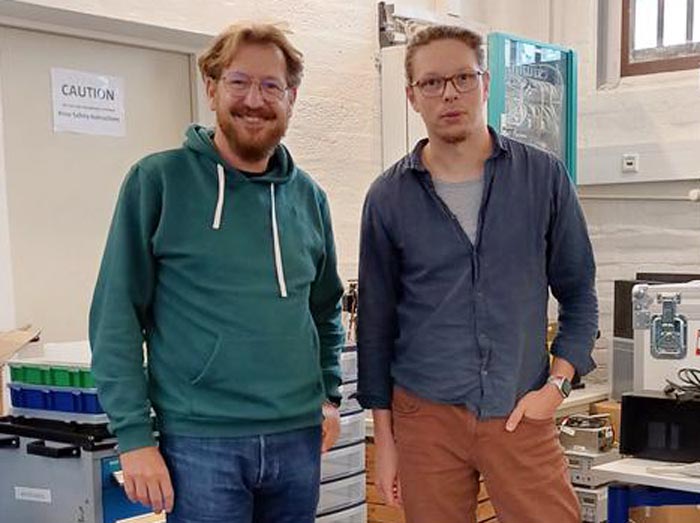Novel method for creating underwater maps

Prof. Dr. Andreas Birk and colleague Tim Hansen.
(c) Constructor University
Dr. Andreas Birk, professor of electrical engineering and computer science at Constructor University in Bremen, and his Ph.D. fellow, Tim Hansen, have developed an innovative method for processing sensor data that enables the creation of underwater maps in real time and with better quality than previous methods.
Accurate underwater map data is typically collected with sonars that use multiple beams in parallel. With the method developed by Constructor University scientists, it is possible to use simple and much less costly single beam sonars than up until now.
“Compared to the state of the art, our approach is cheaper and produces better quality maps,” Birk said.

Prof. Dr. Andreas Birk and colleague Tim Hansen with one of the underwater robots at Constructor University. (c) Constructor University
It is based on a new form of signal processing called “synthetic scan formation.” The method uses an initial rough localization of the robot to form a scan, a local survey of the environment, from the sonar data. The scan is registered with other scans, i.e., the information contained therein is used to determine the spatial relationships between them.
The repetition of this process allows optimized scans with respect to their relative positions and orientations. The velocity of the process even allows to generate maps in real-time.
The scientists tested their software in the U-boat bunker “Valentin” located in Bremen-Farge, one of the largest armament projects of the military navy during the Nazi era. With their new method, which they developed in the frame of a project funded by the German Research Foundation (DFG), they successfully mapped the difficult-to-access and submerged spaces in the bunker.
Entitled “Synthetic Scan Formation for Underwater Mapping with Low-Cost Mechanical Scanning Sonars,” the scientists’ research results have now been published as open source in the journal “IEEE Explore.” Birk wants to make his results available to broader audiences, which is why the source code is also generally accessible; industrial collaborations are also possible.
Wissenschaftliche Ansprechpartner:
Prof. Dr. Andreas Birk | Professor für Elektrotechnik und Informatik
abirk@constructor.university | Tel.: +49 421 200-3113
Weitere Informationen:
Article link:
DOI: 10.1109/ACCESS.2023.3312186
Media Contact
All latest news from the category: Process Engineering
This special field revolves around processes for modifying material properties (milling, cooling), composition (filtration, distillation) and type (oxidation, hydration).
Valuable information is available on a broad range of technologies including material separation, laser processes, measuring techniques and robot engineering in addition to testing methods and coating and materials analysis processes.
Newest articles

NASA: Mystery of life’s handedness deepens
The mystery of why life uses molecules with specific orientations has deepened with a NASA-funded discovery that RNA — a key molecule thought to have potentially held the instructions for…

What are the effects of historic lithium mining on water quality?
Study reveals low levels of common contaminants but high levels of other elements in waters associated with an abandoned lithium mine. Lithium ore and mining waste from a historic lithium…

Quantum-inspired design boosts efficiency of heat-to-electricity conversion
Rice engineers take unconventional route to improving thermophotovoltaic systems. Researchers at Rice University have found a new way to improve a key element of thermophotovoltaic (TPV) systems, which convert heat…



